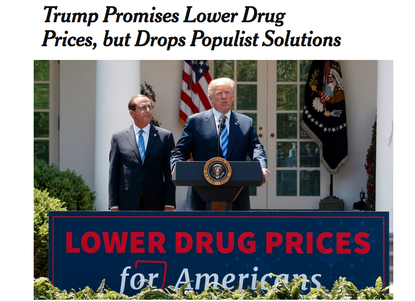In response to the announcement, the stock of pharmaceutical companies, insurance companies, drug supply chains and middlemen have INCREASED. If this new plan of President Trump’s passes, the cost of Medicare Part D will go up, not down.
If President Trump really wanted to lower drug costs, he should start by doing three things:
1. Allow Americans and American corporations to buy FDA approved medications from wherever they are sold (at local prices), and bring them into the United States.
Currently, it is illegal. The price of many U.S. medications can be ten to twenty times the price they are sold for in other countries. For example: menopausal estrogen replacement patches are approximately $120/month in the U.S. From the same manufacturer, they sell for 17 euros or about $20/month. The birth control Mirena IUD, sells for $100 in Europe versus $950 in the U.S. Cancer drugs are highly expensive in the U.S. as well.
2. Ban all prescription drug advertising in the public media. This is already the case in most parts of the world.
Americans have no idea how the financial aspects of U.S. healthcare really operate. For most of the 20th century it was illegal for prescription medications to be advertised to the public. Ronald Reagan changed that. He allowed prescription drug ads for freedom of speech reasons. This allowed the pharmaceutical industry to control the news. The news contains mostly drug ads, never revealing the real story of American medical care. Aside from the U.S., only New Zealand allows drug advertisements to the public.
We knew for a long time about the problems with smoking and health. Yet no progress was made in reducing smoking until cigarette ads were banned from the public media in 1968 — a year that had one of the highest smoking rates in America. Finally, the news media began spreading the truth about cigarettes and sickness.
3. Allow Medicare, all insurance companies and consumer groups to bargain with pharmaceutical industries for better pricing.
Right from the start of Medicare Part D (the drug plan initiated under President George W. Bush), Medicare was forced to pay full retail price for all medications. They were forbidden from negotiating better prices. Medicare Part D became a big boon for the pharmaceutical industry and a huge cost to U.S. taxpayers. Drug prices massively rose at a time when inflation was very low. This was a big driver of the rising costs of health insurance.
Drug companies claim they need the higher profits to pay for research. This is not true. Most basic research is paid for by the federal government. The drug companies then buy up the patents and sell the medications for huge profits.
These are not all of the changes needed, but minimally, they should be a necessary start. President Trump has proposed some other minor changes but it is still not correcting the cause of our huge price increases.

 RSS Feed
RSS Feed